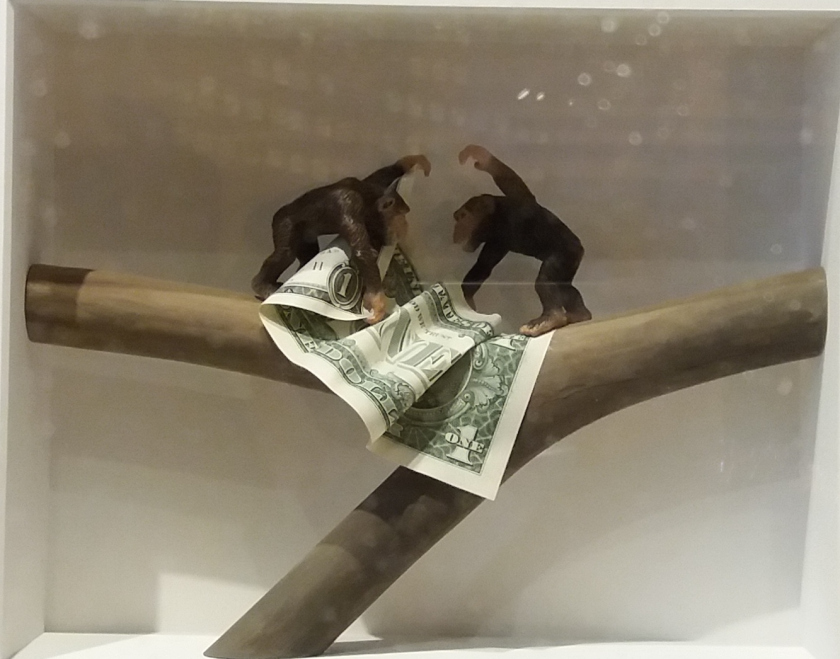We’re diving in to Chapter 1 of Francis Chan’s book Crazy Love this week: “Stop Praying.”
In case you missed my intro to Crazy Love last week, it’s a book that calls for American Christians to revitalize their notions of who God is (our breathtakingly powerful Maker) and live a radical, sacrificial, crazy-in-love-for-God life to prove it. Published in 2008, it swept through American Christian communities right onto the New York Times Bestsellers List. Millions of people have read Crazy Love, and I got to hear from some of you on Facebook and in the comments last week. Thank you to everyone for sharing your own thoughts and experience with the book! Seriously, it’s amazing to hear the beginnings of a discussion… I can’t wait to see what you have to add.
I’m taking Crazy Love chapter by chapter to deconstruct the beautiful and the toxic in Chan’s ideas — and see how they echo larger issues with American conservative Christian theology in general.
This week’s theme: the harm that comes from calling humans puny in response to a mighty God. “Stop Praying”: Tremendous God, puny humansFrancis Chan opens with a passionate preface, and I pulled this quote so we can get an idea of the writer’s own purpose…
“This book is written for those who want more Jesus. It is for those who are bored with what American Christianity offers…
I believe He wants us to love others so much we go to extremes to help them. I believe He wants us to be known for giving — of our time, our money, and our abilities — and to start a movement of ‘giving’ churches. In so doing, we can alleviate the suffering in the world and change the reputation of His bride in America” (21).
Tall order, but sounds respectable, doesn’t it? From the start, Chan plays on the common knowledge that many Americans believe that Christians don’t live up to what they preach. That if God is really as life-changing as Christians claim, Christians’ lifestyles should go from “lukewarm, halfhearted, or stagnant” (22) to an undeniable display of God-driven service in the eyes of nonbelievers. In contrast, he paints a picture of “lives of risk and adventure” (21) that start by “address[ing] our inaccurate view of God, and consequently, of ourselves” (22).
“Stop Praying” is the first step in that paradigm shift. “Stop Praying” is about reexamining what the Bible says about God, and what that implies about how crazy big and powerful he is. According to Chan, this realization should humble us beyond measure — the God of all things deigns to love and die for us?! — so much that we understand we owe Him our whole lives in service. Crazy Love’s call to paradigm and lifestyle shift rests on this notion.
And oh, did it ever stop me in my tracks. This is the chapter that blew the doors off my perception of how “big” God was. It’s also the chapter that blew the doors off my perception of how “puny” (38) I was supposed to be in contrast.
Chan starts out by having readers put down the book and watch a video, “The Awe Factor of God.” In it, Chan pulls a Neil DeGrasse Tyson for 3 minutes, narrating a zoom-out from planet Earth all the way to clusters of galaxies. Back in the book, he asks us readers why God would create all this. To Chan, the answer is, “perhaps God wanted us to see these pictures so that our response would be, ‘Who do I think I am?'” (26).
Chan goes on to a thrillingly beautiful description of God’s creations. As a Christian teen? I was obsessed with this passage. I read it ’til I could recite it. I watched that video on my bathroom floor til I cried. Chan dropped facts about the smallest details of creation: how many muscles are in a caterpillar’s head, or species of tree in a square mile of Amazon jungle (27). Chan wrote of a God who was creator of laughter, spider silk, goosebumps, and yes, galaxies. It was an effective reminder that if God was Creator like I was raised to believe, then he was unfathomably more brilliant, artistic, and original than I ever thought. It filled me with awe and inspiration.
This is why I find it so heartbreaking and hard to understand why, in the next paragraph, Chan would conclude that the span of creation means “know this: God will not be tolerated. He instructs us to worship and fear Him” (28).
Reading this now, years after deconstructing my faith, I mourn that this is Chan’s gut response to seeing the universe God supposedly created. Not that we might see ourselves reflected in the terrifying, breathtaking majesty of space as fellow creation or even simply that through it, God tells us about who he is and how powerful he is to care for and love us through it. It’s about self-deprecation. This gut response drives all the rest of Chan’s theology, ultimately so damaging to my own self-esteem.
Chan does it again in his next section. Loving God should be natural, he writes, and when it’s not, it means we’ve forgotten he’s the Creator. We need reminders, just like he’s reminded of how lucky he to be with his wife. Touching, but then he again puts love and fear side by side: “Because we don’t often think about the reality of who God is, we quickly forget that He is worthy to be worshipped and loved. We are to fear him” (30).
So Chan sets out on a quick refresher on the attributes of God.
In his definitions, Chan drives home that God is dimensions beyond our comprehension. We just can’t even. Some of this could inspire someone to joy or peace, thinking that a God who is huge beyond compare loves you: he should never stop having your back. I can no longer believe in a being that too good to be true, but I respect how hugely healing or comforting this could be or is to other people.
Instead, Chan writes, “Can you worship a God who isn’t obligated to explain His actions to you? Could it be your arrogance that makes you think God owes you an explanation? Do you really believe that compared to God, ‘all the peoples of the earth are regarded as nothing,’ including you?” (34)
Chan concludes his chapter by imagining the events of Revelation 4 and Isaiah 6, where John and Isaiah, respectively, have fantastical and terrifying visions of what God’s throne in heaven looks like. Once again, instead of focusing on God’s strangeness and might, he turns his awe into self-belittlement:
The take home“The appropriate way to end this chapter is the same way we began it — by standing in awed silence before a mighty, fearsome God, whose tremendous worth becomes even more apparent as we see our own puny selves in comparison” (38).
Wow. Chan tells readers to take a breather after that first chapter, and I don’t know about you guys, but I need to… just not for the reasons he’s thinking.
Reading back on all this, I cannot believe the feat that Francis Chan accomplished by constructing a notion of God with so much potential to bring people wonder, peace, and joy… and then used that wonder, peace, and joy to break them down instead. See that? You’re puny. Who do you think you are?
I can’t make this up: he even wrote, “when you get your own universe, you can make your own standards” (34). It strikes me again and again how thoroughly Chan seems to be so un-self aware of how his “radical” theology discourages people from asking questions and finding worth in the grandeur of God without putting themselves down.
It’s taken me a long time to deconstruct my faith. I know some folks out there who’ve deconstructed their faiths and say that the universe does make them feel that humans are tiny and ineffectual in contrast. My view’s the opposite. I see the universe and I think of how incredible it is to be alive, how lucky we are to exist alongside it all. We are all welcome to our own interpretations of what it means to be here!
Where it gets red-flag dangerous is when people start to see people as truly unworthy. This is what Chan believes. Humans do not have the right to question God: “When we disagree, let’s not assume it’s His reasoning that needs correction” (34). Humans should understand that none of us are good. Humans should stop forgetting that God is so huge he automatically deserves our worship, love, and fear. Silly humans. Who do we think we are.
Can you see how poisonous it could be to someone to believe this, nevertheless be raised in it as a child? Imagine what it might do to their concept of what they’re worth? Can you hear how imbalanced the power dynamic is, that you are not even allowed to question God’s decisions? How can you love and respect a God whose rules are the rules simply because he’s bigger than you?
How Chan can promote a movement of Christians alleviating suffering and helping one another when he has such a low opinion of humans is beyond me.
Chan’s views are blunt. They were blunt even for my church. But we can’t pin it all on him. The idea that God is so big, therefore we are so nothing, is woven into Christian culture. How many times have you heard this Christianese:
He must increase, but I must decrease (John 3:30)
Apart from God we can do nothing (John 15:5)
Who are we to question God? (Job 38)
JOY: Jesus, Others, You
Who am I that the Lord of all the earth would care to know my name…
Who am I that You would be mindful of me…
The idea that people are little, powerless, have no agency, have no right to question the ~way things are~, is woven into Christianity through the very concept of original sin. Really? We are so inherently horrible, from birth, that we deserve nothing more than being tortured for eternity? I heard pastors even use a baby’s cry as a metaphor for sin.
I talk a LOT on this blog about all the harm that Christian theology can do to people’s relationships with themselves and the world around them. With all of that said, I think there is a way Christianity could stop that harm. Of course, I think you’d need to completely drop the concept of original sin itself to get there, or at least totally revamp it.
But here’s something I think is more feasible for Christians right now. Maybe this is still too radical. I’m not telling Christians what to do. I am making a plea from someone who loved, lived, and left it all because of this very thing.
Don’t take Francis Chan’s path. Don’t point to God’s size and wonder and go, that means we’re puny and are so unworthy of God’s love that we should grovel and remember how lucky we are all our lives. Point to it and say, that means God has our backs. That means some of that same potential, creativity, love, and brilliance is in us.
If God loves us while being that big, it means he doesn’t love us DESPITE it. It means he loves us because we DESERVE it.I don’t know about you guys reading it, but that is a Christianity I could get behind. That is a Christianity that would build people up. That is a Christianity I might not have left.
So, that’s Chapter 1, and I promise that’s the least I can possibly go on about it.





